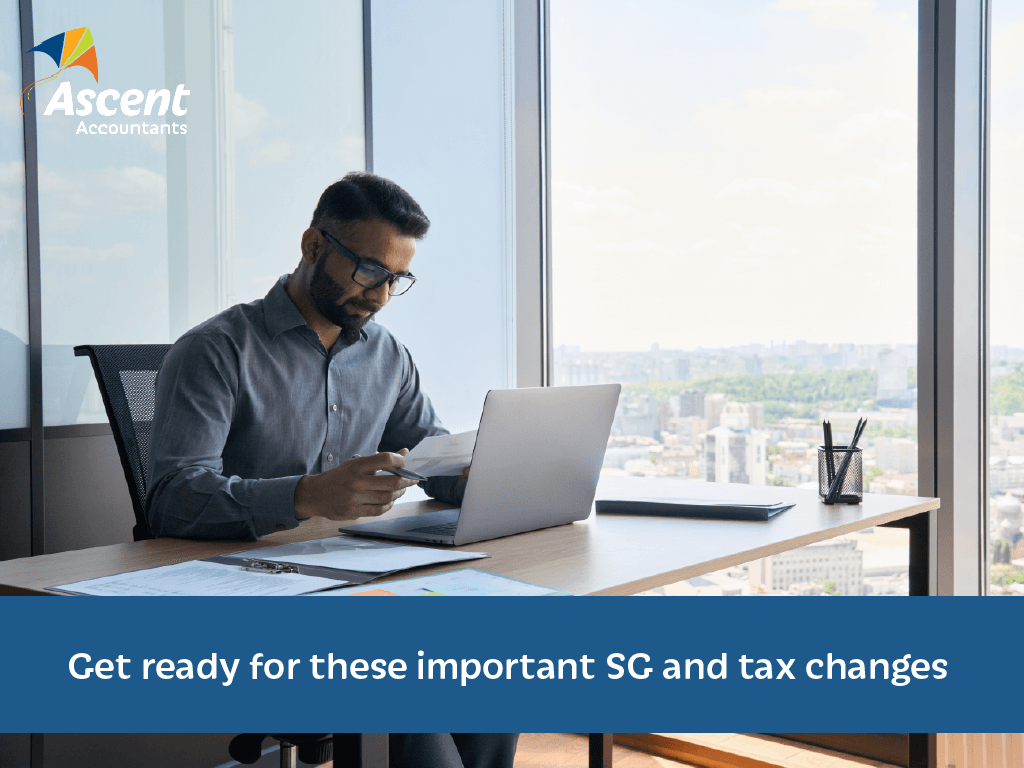Get ready for these important SG and tax changes

Tax time is almost here, and surprise-surprise, the ATO is implementing a few changes from July 1. There are four changes we’re going to discuss (as well as some other tax tips) — read on to see if you’ll be affected.
1. Super guarantee changes
From 1 July 2022, employees can be eligible for super guarantee (SG), regardless of how much they earn. A few months ago, we talked about this briefly when the initial decision was made to scrap the $450 per month eligibility threshold for when SG is paid. Now, it’s finally coming into action. You also only need to pay super for workers under 18 when they work more than 30 hours in a week.
Additionally, the SG rate will increase from 10% to 10.5% on 1 July 2022. You'll need to use the new rate to calculate super on payments you make to employees on or after 1 July. This has to happen even if some, or all, of the pay period is for work done before 1 July. Make a note that this is legislated to happen again, with the SG rate increasing to 12% by 2025.
So, what’s the takeaway? Make sure you update your payroll and accounting systems so that you continue to pay the right amount of super for your employees.
2. Company tax rate changes
The company tax rate is now 25% for business profits in a company structure. From the 2021–22 income year, companies that are base rate entities must apply the 25% company tax rate. You might be aware that the rate was 27.5% from the 2017–18 to 2019–20 income years, and 26% in the 2020–21 income year.
Not sure if you’re a base rate entity? A company is a base rate entity for an income year if the company’s aggregated turnover for that income year is less than the aggregated turnover threshold for that income year. And, 80% or less of their assessable income in that income year is base rate entity passive income. This replaces the requirement to be carrying on a business from the 2017–18 income year onwards.
3. Temporary full expensing changes
Temporary full expensing has been extended to 30 June 2023. You probably remember that in 2020, the Australian Government introduced tax incentives to support Australian business owners as they navigated the impacts of COVID-19. Perhaps you’re one of them! One of the temporary tax incentives was temporary full expensing. This incentive has now been extended for eligible businesses until 30 June 2023. These rules allow the cost of new or second-hand assets (for eligible entities) to be written off in full, in the year they are installed and ready for use. There is no limit on the cost of these assets (previously, the cap was $150,000).
4. COVID tests as tax deduction changes
You can claim a deduction in 2021–22 for costs you incurred as a result of COVID-19 test expenses. This applies when you used the test to determine whether you could attend work, but does not apply if you had to quarantine and could still work from home. The test can be any test in the Australian Register of Therapeutic Goods, such as a polymerase chain reaction (PCR) test or rapid antigen (RAT) test.
To claim a deduction, you must have a receipt to show that you incurred the cost (if your employer reimbursed you for the cost, you cannot claim a tax deduction). You also need records (e.g. an email) to show you were required to take the test for work purposes. You can also claim a deduction for the test if you required the test to undertake travel away from your home overnight for work purposes.
Make sure you only claim the work-related portion of your expense on COVID-19 tests. For example, if you buy a multipack of COVID-19 tests and use some for other family members, you can only claim the portion of the expense you used for a work-related purpose.
If you were required to travel or pay for parking to undertake the test, you can’t claim these expenses.
And don’t forget this stuff…
Everyone needs to remember that before 30th June 2022:
Your 2021 tax return needs to be lodged. If your 2021 tax return is not lodged by the 30th June 2022, you not only will get fined by the ATO but you will be required to pay back any Family Tax Benefit and Child Care Rebate Entitlements.
If you’re making super contributions as a tax deduction for the financial year, your superfund must have received and cleared the money to get the tax deduction. Most funds are saying they need to receive the money contributed before 23rd June to ensure it clears in time.
Employers must pay staff super to get the tax deduction in the current financial year. Super paid after the 30th June will be deductible in the next financial year.
Businesses should look at options in June of prepaying expenses or deferring income to help reduce the current year’s profits.
If you have a Family Trust all trustee resolutions must be in place.
Let’s chat about changes.
Not sure how these changes affect you? Let’s talk about it. Clients can contact Ascent Accountants for any tax planning discussion in June, especially if you have Capital Gains or business profits are higher. Planning before 30th June is essential — nothing can be changed afterwards.
Contact us to get started, and discover how we can support you this tax season.
Need help with your accounting?








